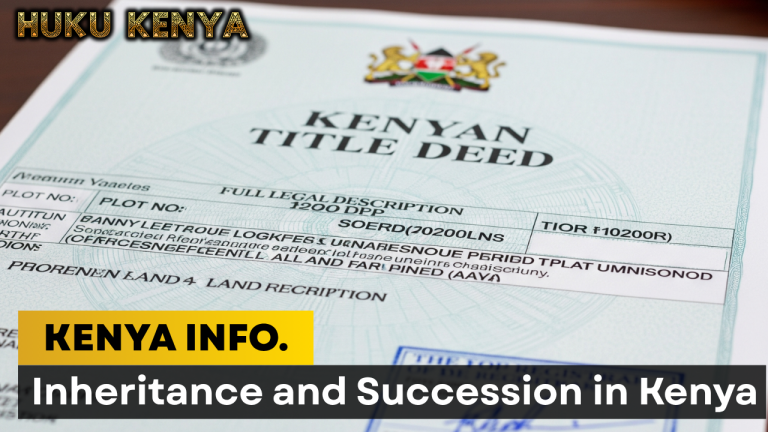
A Comprehensive Guide for All Assets
In Kenya, the topic of inheritance and succession is deeply intertwined with culture, family dynamics, and, crucially, the law. The process of transferring property, rights, and obligations from a deceased person to their rightful heirs is often complex, emotionally charged, and, if not handled properly, can lead to protracted disputes and financial distress for surviving family members.
The cornerstone of inheritance law in Kenya is The Law of Succession Act (Cap 160). Enacted in 1981, this Act aimed to provide a systematic and uniform approach to succession across all communities, harmonizing various customary practices and pre-existing laws. However, it’s important to note that the Act does recognize certain exceptions for Muslims (governed by Islamic law) and, to some extent, customary law in specific circumstances, provided it does not conflict with statutory provisions or the Constitution.
This comprehensive guide will delve into the intricacies of inheritance and succession in Kenya, covering everything from real estate and vehicles to company shares and personal belongings, and outlining the critical steps involved in ensuring a smooth and fair transfer of wealth.
The Two Pillars of Succession: Testate vs. Intestate
The entire process of inheritance hinges on one fundamental question: Did the deceased leave a valid will?
1. Testate Succession (With a Will)
Testate succession occurs when a person dies having left a legally valid will (known as a “testator”). A will is a crucial document that outlines the deceased’s explicit wishes regarding the distribution of their estate.
Requirements for a Valid Will in Kenya:
For a will to be considered legally binding under Kenyan law, it must meet stringent requirements:
- In Writing: The will must be a physical document.
- Signed by the Testator: The testator must sign the will, or affix their mark (e.g., thumbprint), or have another person sign it in their presence and under their direction.
- Sound Mind and Age: The testator must be of sound mind and at least 18 years old when making the will. They must understand the nature of the document they are signing and its implications.
- Witnessed: The signature of the testator must be made or acknowledged in the presence of at least two competent witnesses. These witnesses must also attest and sign the will in the presence of the testator. Crucially, witnesses should not be beneficiaries in the will, as this could invalidate their inheritance.
- Appointment of an Executor: A will typically names an executor (or multiple executors) who will be responsible for administering the estate according to the testator’s wishes.
Benefits of Having a Will:
- Expresses Your Wishes: Ensures your assets are distributed exactly as you intend.
- Avoids Family Disputes: Clearly documented distribution significantly reduces conflicts among beneficiaries.
- Speeds Up Process: Generally, the process of executing a will (probate) is faster and less cumbersome than intestate succession.
- Appoints Guardians: Allows you to appoint guardians for minor children.
- Business Continuity: Essential for business owners to ensure a structured transfer of business interests.
Contesting or Revoking a Will: A will can be challenged in court on various grounds, including:
- Fraud or Forgery: If the will was not genuinely made by the deceased.
- Undue Influence: If the testator was coerced or pressured into making the will in a certain way.
- Lack of Testamentary Capacity: If the testator was not of sound mind when making the will.
- Improper Execution: If the legal formalities (signing, witnessing) were not met.
- Disinheritance of Dependents: Kenyan law protects dependents (spouse, children, parents, or other relatives who were financially dependent on the deceased) from unfair disinheritance. A court can order reasonable provision from the estate for such dependents even if they were left out of the will.
2. Intestate Succession (Without a Will)
Intestate succession occurs when a person dies without having made a valid will, or where the will made is deemed invalid by the court, or where the will does not cover the entire estate (partial intestacy). In such cases, the distribution of the deceased’s estate is strictly governed by the Law of Succession Act (Cap 160).
The Act provides a clear hierarchy for distributing the estate, prioritizing certain family members:
- Surviving Spouse and Children:
- If the deceased leaves a surviving spouse and children, the surviving spouse is entitled to the personal and household effects (movable property like furniture, electronics, cars) of the deceased absolutely.
- The spouse also gets a life interest in the remaining estate (immovable property like land, houses, and the residue of movable property). This means the spouse can use and benefit from these assets during their lifetime. However, they cannot dispose of the capital (e.g., sell the land) without the consent of the children or a court order.
- Upon the death of the surviving spouse, or if the spouse remarries (which causes the life interest to lapse), the remaining property devolves upon the children in equal shares, regardless of gender or marital status.
- Children, whether born within or outside marriage, or legally adopted, generally have equal rights to inherit.
- Surviving Spouse, But No Children:
- The surviving spouse inherits the personal and household effects absolutely.
- They also inherit the first KSh 10,000 out of the residue of the net intestate estate, or 20% thereof, whichever is greater.
- The spouse then takes a life interest in the remaining balance. If they remarry, this life interest determines, and the property devolves to other relatives in a prescribed order.
- No Surviving Spouse, But Children:
- The net intestate estate is divided among the children in equal shares. If any child has predeceased the intestate but leaves behind children, those children will take their parent’s share (per stirpes).
- No Surviving Spouse or Children:
- The estate devolves in the following order of priority:
- Father.
- Mother (if the father is deceased).
- Brothers and sisters of the deceased, and any children of deceased brothers and sisters.
- Half-brothers and half-sisters, and any children of deceased half-brothers and half-sisters.
- Other relatives who are in the nearest degree of consanguinity (blood relation) to the deceased.
- If no heirs exist, the property may revert to the State through bona vacantia laws.
- The estate devolves in the following order of priority:
- Polygamous Marriages:
- If an intestate was married more than once under any system of law permitting polygamy, their personal and household effects and the residue of the net intestate estate are divided among the “houses” (each wife and her respective children) according to the number of children in each house, with each wife surviving him also being considered as a “child” for the purpose of this division.
Assets and Their Succession:
The Law of Succession Act applies to all types of property, both movable (personal chattels) and immovable (real estate).
1. Land and Houses (Immovable Property)
This is often the most significant and contentious asset in inheritance cases.
- Title Deeds: Original title deeds are crucial. The process involves transferring ownership from the deceased to their heirs.
- Valuation: Professional valuation of the land and structures is often required, especially for complex estates, to determine fair market value for distribution and any applicable charges.
- Land Control Board Approvals: If agricultural land is involved, Land Control Board consent might be necessary for subdivision or transfer of shares, particularly for transmissions to multiple beneficiaries.
- Subdivision: Where land is to be shared among multiple heirs, the land may need to be formally subdivided after the confirmation of the grant of representation.
- Leasehold vs. Freehold: The type of tenure can impact the long-term rights of beneficiaries.
2. Companies and Business Assets
Succession planning for businesses is critical to ensure continuity and prevent the collapse of a venture after the death of a proprietor or shareholder.
- Sole Proprietorships: The business assets become part of the general estate and are distributed according to the will or intestacy rules. This often requires the business to be wound up or sold.
- Partnerships: Partnership agreements should ideally have clauses on what happens upon the death of a partner (e.g., buy-out clauses). Without such clauses, the partnership may dissolve, and the deceased’s share becomes part of their estate.
- Limited Companies (Shares): Shares in a company are movable property.
- Testate: If a will exists, the shares are transferred to the named beneficiaries.
- Intestate: The shares will be distributed according to the intestacy rules. The beneficiaries will then become shareholders in the company. This can sometimes lead to complications if the new shareholders do not have the expertise or interest in running the business.
- Family Businesses: It’s highly recommended for family businesses to have a detailed business succession plan that outlines who will take over leadership, how shares will be transferred, and how potential disputes among family members involved in the business will be resolved. This can involve buy-sell agreements, trusts, or specific clauses in the company’s articles of association.
3. Cars and Other Vehicles (Movable Property)
Vehicles are part of the personal and household effects.
- Testate: The will explicitly states who inherits the vehicle.
- Intestate:
- If there’s a surviving spouse, they are entitled to the vehicle absolutely as part of the personal and household effects.
- If no spouse, it forms part of the residue of the estate to be shared among children or other heirs.
- Transfer of Ownership: Once the grant of representation is confirmed, the administrator/executor will facilitate the transfer of vehicle ownership through the National Transport and Safety Authority (NTSA). This requires the grant of representation, death certificate, and identity documents of the beneficiaries.
4. Bank Accounts, Investments, and Other Financial Assets
- Bank Accounts: The executor or administrator will need the grant of representation to access the deceased’s bank accounts, pay off debts, and distribute the remaining funds to beneficiaries.
- Fixed Deposits, Saccos, Unit Trusts, Shares (NSE): Similar to bank accounts, these assets require the grant of representation for transfer or liquidation. For shares held at the Nairobi Securities Exchange (NSE) through a CDS account, the Central Depository and Settlement Corporation (CDSC) facilitates the transfer upon presentation of the grant.
- Life Insurance Policies: These often have named beneficiaries, in which case the proceeds usually bypass the probate process and are paid directly to the designated beneficiaries. If no beneficiary is named, the proceeds form part of the deceased’s estate.
- Pension Funds: Like life insurance, pension benefits often have nominated beneficiaries. If not, they become part of the estate.
- Digital Assets: This is a growing area. It includes online accounts (social media, email), cryptocurrencies, domain names, and digital content. It’s crucial to include provisions in a will or estate plan for managing or transferring access to these digital assets, as they may hold significant value or sentimental importance.
5. Personal Belongings and Household Effects
These include furniture, electronics, jewellery, art, and other chattels.
- Testate: The will can specifically bequeath items to individuals.
- Intestate: The surviving spouse generally inherits these absolutely. If there’s no spouse, they form part of the residue for distribution.
The Probate and Administration Process in Kenya: Step-by-Step
Regardless of whether a will exists, the process of legally transferring assets from the deceased’s name to the beneficiaries involves the courts. This process is known as Probate and Administration.
- Reporting the Death & Obtaining Death Certificate: The first step is to register the death and obtain an official death certificate from the civil registration department. This is a mandatory document for all subsequent steps.
- Locating the Will (If Any): Ascertain if the deceased left a valid will. This will determine whether you apply for a Grant of Probate or Letters of Administration.
- Application for a Grant of Representation:
- Grant of Probate: Applied for when there is a valid will. The executor(s) named in the will petition the High Court or a Resident Magistrate’s Court for this grant.
- Letters of Administration (Intestate): Applied for when there is no valid will. Close relatives (surviving spouse, children, parents, siblings, etc., in order of priority) apply to the court to be appointed as administrators of the estate. If there are minor children, at least two administrators are typically required.
- Required Documents: The application typically includes the death certificate, the original will (if any), a list of assets and liabilities, and details of all beneficiaries/heirs. A letter from the local chief listing beneficiaries is often required for intestate matters.
- Gazettement of the Petition: Once the application is filed, the court publishes a notice in the Kenya Gazette. This notice invites any person with an objection to the grant or a claim against the estate to raise it within 30 days.
- Issuance of the Grant of Representation:
- If no objection is lodged within the 30-day period, or if any objections are heard and dismissed by the court, the court issues the Grant of Probate or Letters of Administration.
- This grant gives the executor or administrator the legal authority to manage the deceased’s estate.
- Confirmation of the Grant:
- After six (6) months from the date of the issuance of the grant (to allow time for any claims against the estate to be settled), the executor/administrator must apply to the court for confirmation of the grant.
- This application details how the deceased’s properties will be distributed among the beneficiaries as per the will or the Law of Succession Act.
- All beneficiaries must generally agree to the proposed mode of distribution, especially in intestate cases, to minimize disputes. The court will read out the proposed distribution in a language understood by the beneficiaries to ensure their agreement.
- Settling Estate Liabilities: Before distribution, the executor/administrator must:
- Identify and gather all assets.
- Pay off any outstanding debts of the deceased (e.g., loans, mortgages, utility bills).
- Cover funeral expenses and the legal costs incurred in obtaining the grant.
- Distribution of Inherited Property:
- Once the grant is confirmed, the executor/administrator can proceed to distribute the assets to the rightful beneficiaries as approved by the court.
- This involves transferring title deeds for land/houses, transferring vehicle logbooks, closing bank accounts and distributing funds, transferring company shares, etc.
- The administration process, excluding continuing trusts, should ideally be completed within six months of the grant’s confirmation, or an extended period allowed by the court.
- Closing the Estate: After all assets are distributed and liabilities settled, the executor/administrator files a final report with the court, detailing how the estate was handled. The court then officially closes the probate case.
Interaction with Other Laws & Special Considerations:
- Customary Law: While the Law of Succession Act aims for uniformity, it acknowledges the existence of customary practices. However, where customary laws conflict with the Act, especially concerning principles of equality and fairness (e.g., disinheriting daughters), the Act generally takes precedence.
- Islamic Law: For individuals of the Muslim faith, succession is primarily governed by Islamic law (Sharia), unless they have expressly opted for the Law of Succession Act. Islamic inheritance principles are distinct, often involving fixed shares for specific heirs.
- Matrimonial Property Act: While succession deals with inheritance upon death, the Matrimonial Property Act (2013) governs the division of property acquired during marriage in the event of separation or divorce. It’s crucial for individuals to understand how these laws interact, especially in blended families or second marriages.
- Unclaimed Financial Assets (UFAA): If assets remain dormant or unclaimed for a specified period (e.g., bank accounts without transactions for 5 years), they may be transferred to the Unclaimed Financial Assets Authority (UFAA). Heirs must then follow UFAA procedures to claim them.
- Taxes: While Kenya does not have an inheritance or estate tax, other taxes might apply, such as Capital Gains Tax (CGT) on the transfer or sale of certain assets (like property and shares) within the estate. Stamp duty is also applicable on property transfers.
The Importance of Estate Planning:
Given the complexities and potential for disputes, effective estate planning is not just for the wealthy; it’s essential for every Kenyan.
- Draft a Legally Binding Will: This is the most fundamental step. Review and update it regularly (after marriage, divorce, birth of a child, acquisition of significant assets).
- Establish Trusts: Trusts are increasingly popular in Kenya. A trust is a legal arrangement where assets are transferred to trustees to manage for the benefit of beneficiaries. They can provide for minors, protect assets from creditors, control the timing of distribution, and even potentially offer tax benefits. Assets transferred to a trust generally bypass the lengthy probate process.
- Appoint an Executor/Trustee: Choose a competent, trustworthy individual or a professional firm (advocates, trust companies) to administer your estate.
- Maintain Records: Keep meticulous records of all assets (title deeds, share certificates, bank account details, logbooks) and liabilities in an accessible, secure place. Inform your executor/trusted family members of their location.
- Review Beneficiary Designations: For assets like life insurance and pension policies, ensure beneficiary designations are up-to-date, as these typically override a will.
- Seek Professional Advice: Engage with an experienced advocate specializing in succession law to help draft your will, set up trusts, and guide your family through the probate process.
Special Situations
A. Minors as Beneficiaries
- Assets held in trust until age 18
- Court appoints guardian and trustee
B. Spouses and Widowers
- 2025 ruling struck down discriminatory clause requiring widowers to prove dependency
- Now equal treatment of both male and female spouses
C. Polygamous Families
- Each household treated as a unit
- Widows inherit separately
- Children from all unions inherit equally
D. Non-Citizen Beneficiaries
- Allowed under succession law
- Must appoint Kenyan resident administrator for land matters
E. Debts and Liabilities
- Paid before any distribution
- If debts exceed estate, court may declare it insolvent
- No inheritance is issued until debts cleared
Common Conflicts
- Disputes over land boundaries or titles
- Secret second families not disclosed
- Customary disinheritance (especially of daughters)
- Fake wills or forgeries
- Misuse of estate by temporary administrators
- Lack of documentation (especially in rural estates)
How to Plan for Succession (If You’re Alive)
Create a Will. It’s your voice after death.
- Must name executor, guardian (if minors involved), and list key assets
- Sign with two witnesses (not beneficiaries)
- Keep copies safely—banks, lawyers, family
Declare and Register Assets.
- List land, shares, bank accounts, businesses, loans
- Open joint accounts or use designated nominees
- Consider trust structures or company incorporation if you have multiple heirs
Talk to Your Family.
- Transparency reduces future conflict
- Share intentions and documentation with trusted persons
Inheritance and succession are critical life events that impact families deeply. By understanding the legal framework in Kenya and engaging in proactive estate planning, individuals can ensure their legacy is preserved, their loved ones are provided for, and the transition of their hard-earned assets is as smooth and peaceful as possible.

























